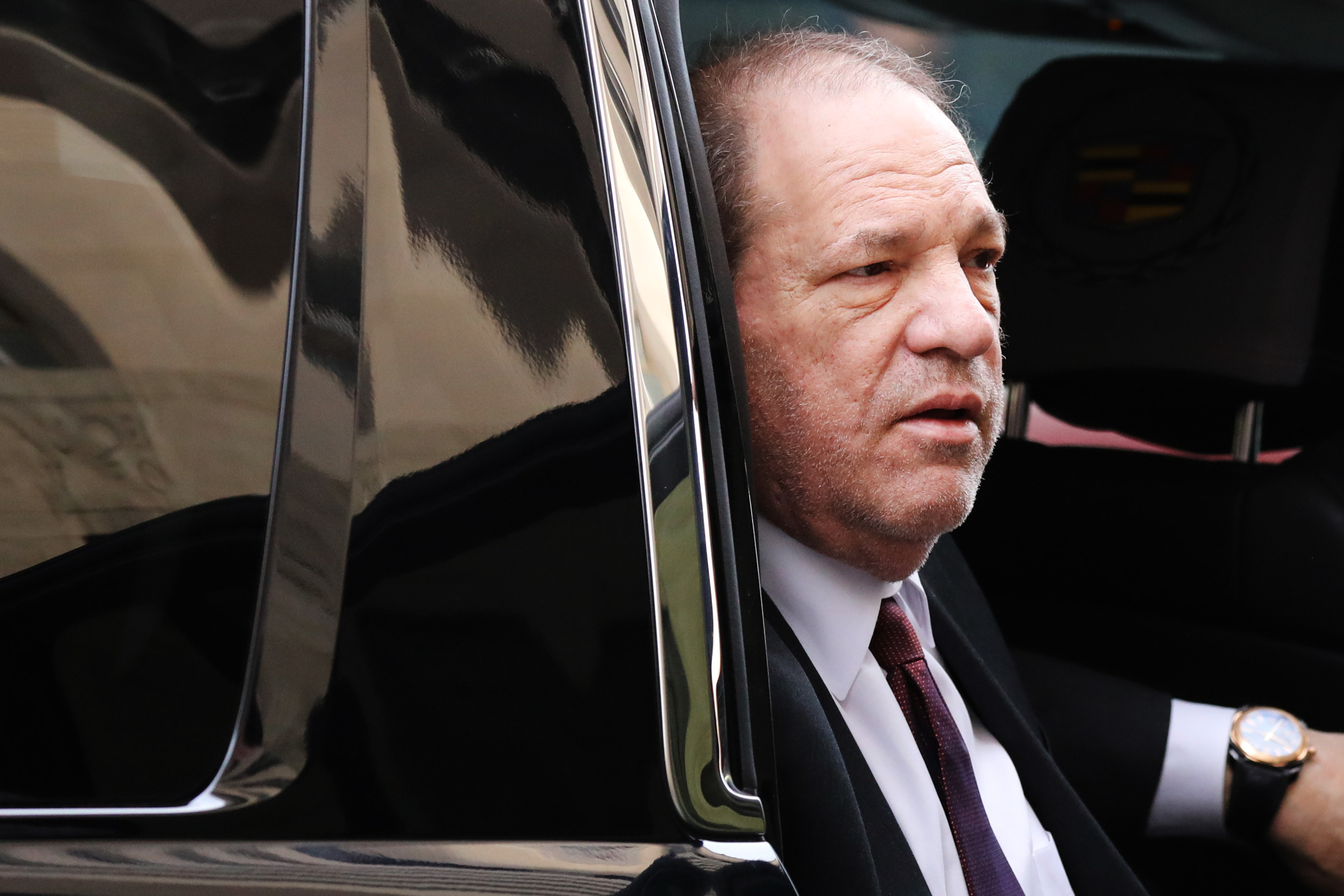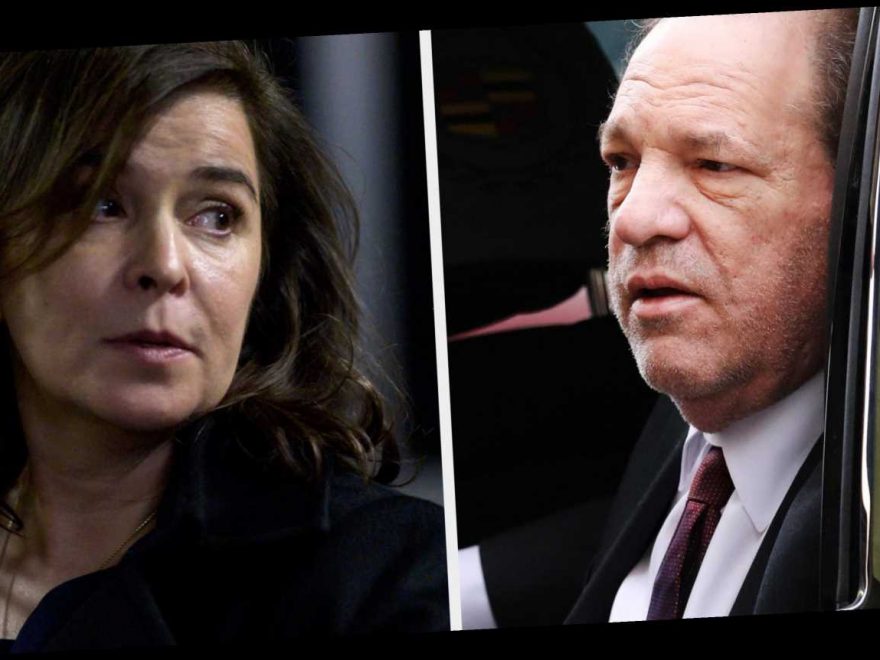- Weinstein On Trial
As the third day of deliberations came to a close, the jury requested to rehear the cross-examination “and everything afterwards” in Sciorra’s testimony.
ByTasneem Nashrulla


Harvey Weinstein arrives to court.
As they decide Harvey Weinstein’s fate, the seven men and five women of the jury have requested to rehear key testimonies from witnesses in the trial, specifically Annabelle Sciorra, whose rape allegations support the most serious sex charges against the disgraced producer.
The jury hasn’t reached a verdict after three days of deliberations during which they focused their questions on the testimonies and evidence related to Sciorra, who alleged that Weinstein raped her in the ‘90s, and Miriam Haley, a former production assistant, who said that he forcibly performed oral sex on her in 2006.
Weinstein, 67, is charged with two counts of predatory sexual assault, one count of criminal sexual act in the first degree, one count of first-degree rape, and one count of third-degree rape. Given the structure of the charges, he can only be convicted of two charges at the most.
The jury needs to believe both Sciorra and Haley’s testimonies in order to convict Weinstein on the first count of predatory sexual assault, the most serious charge that carries a possible life sentence. Similarly, the jury also needs to believe the testimonies of both Sciorra and Jessica Mann — an aspiring actor who alleged Weinstein raped her in 2013 — to convict him on another count of predatory sexual assault.
If jurors do not believe Sciorra’s account of the alleged rape, but do believe Haley’s allegations, they can find Weinstein guilty of criminal sexual act in the first degree. And if they only believe Mann’s account, they can convict him of first- or third-degree rape, but not both.
Over the course of three days, jurors have sent the most notes pertaining to Sciorra’s testimony and evidence.
As the third day of deliberations came to a close Thursday, the jury requested to rehear the cross-examination “and everything afterwards” in Sciorra’s testimony. The testimony will be read out to them in court Friday morning.
They also requested a list of people that Sciorra spoke to about the alleged rape. The judge told them that as the list wasn’t received into evidence, they could not see it.
On Tuesday, jurors asked the court to explain why there wasn’t a standalone charge against Weinstein for Sciorra’s allegations. Weinstein could not be charged based solely on Sciorra’s account because the statute of limitations has run out on her allegations. So prosecutors paired her testimony with that of Mann’s and Haley’s to support the predatory sexual assault charges.
On Wednesday, the jury requested to rehear the testimony of Sciorra’s friend, Rosie Perez, who testified that Sciorra had confided in her about being raped by Weinstein in the ‘90s. Perez said she had urged Sciorra to report it to police but Sciorra feared that Weinstein would “destroy my career.”
Jurors also requested all communication between Weinstein and producer Paul Feldsher. Weinstein’s defense had called Feldsher as a witness to testify that Sciorra had told him that she “did a crazy thing with Harvey” at some point in the ‘90s and that he assumed she was “fooling around” with him.
But Feldsher’s testimony backfired for the defense when prosecutors revealed he was in close contact with Weinstein after the allegations against him surfaced in 2017 and that he had said derogatory things about Sciorra and the other women who had accused Weinstein.
The jury asked to see all communications mentioning Sciorra, including emails involving Black Cube and Guidepost Solutions, two private intelligence companies that Weinstein approached to spy on the women who accused him of sexual misconduct. Sciorra’s name had appeared on a “red flag” list that was sent to both companies, prosecutors said.
On day two of their deliberations, the jury also focused their attention on Haley’s account, asking the court to read out portions of her testimony pertaining to her allegations that Weinstein sexually assaulted her in two separate incidents in 2006. Haley said that Weinstein pulled out her tampon and forcibly performed oral sex on her in his Soho apartment in New York City. Two weeks later, she said, he sexually assaulted her in a Tribeca hotel room, while calling her a “whore” and a “bitch.”
Jurors also asked for all emails between Weinstein and Haley. Weinstein’s lawyers have sought to discredit Haley’s credibility by pointing to friendly emails that Haley sent the producer after the alleged sexual assaults occurred.
Two court reporters on Wednesday read out both Perez’s and Haley’s testimonies, including the questioning by prosecutors and defense lawyers, while some jurors took notes.
The jury also wanted to see a slideshow presentation by Dr. Barbara Ziv who testified for the prosecution about the persistence of rape myths. However, the judge denied the request, telling the jury that her presentation was not submitted as evidence.

Harvey Weinstein’s attorney Donna Rotunno (right) has a conversation at the courthouse.
While jurors were deliberating, Weinstein’s lawyers and prosecutors argued over one of them. Weinstein’s attorney, Damon Cheronis, asked the judge to dismiss her because she had read and reviewed a book — My Dark Vanessa — about “predatory older men” and was currently reading a French book, Le Consentement, related to child sexual abuse. However, Judge James Burke refused to dismiss the juror, saying, “she just has not done anything wrong.”
On Tuesday, prosecutor Joan Illuzzi-Orbon accused Weinstein’s lead lawyer, Donna Rotunno, for bordering on “jury tampering” after she wrote a Newsweek op-ed imploring jurors to do “the right thing” by acquitting Weinstein.
“It is completely, 100% inappropriate behavior,” Illuzzi-Orbon told the judge. “If this is the conduct that is allowed to persist in this courthouse, Judge, then we are all lost…”
Rotunno defended herself, saying her op-ed was about the jury system and the criminal justice system “as a whole” and that the theme of her piece closely mirrored her closing arguments in which she urged jurors to make the “unpopular” decision of acquitting Weinstein.
This is the second time Rotunno appeared to violate the judge’s instructions not to discuss the case and the jury with the press. She had previously talked about it on a New York Times podcast during the trial but claimed that she had recorded the interview before the proceedings began.
Judge Burke ordered Weinstein’s defense team on Tuesday to stop talking to the public and press until the verdict.
“I will caution you about the tentacles of your public relations juggernaut,” Burke told the lawyers.
Cheronis on Wednesday asked the judge to impose a gag order on celebrity lawyer Gloria Allred who is representing three of the alleged victims outside of the criminal case and has been present in the courtroom on most days since the trial began on Jan. 6.
Cheronis accused Allred of trying to “influence the jury” by talking to prosecutors and giving statements to the media about her clients.
The judge dismissed his motion, simply saying, “I wish I had that kind of authority.”

Tasneem Nashrulla is a reporter for BuzzFeed News and is based in New York.
Contact Tasneem Nashrulla at [email protected].
Got a confidential tip? Submit it here.
Source: Read Full Article
